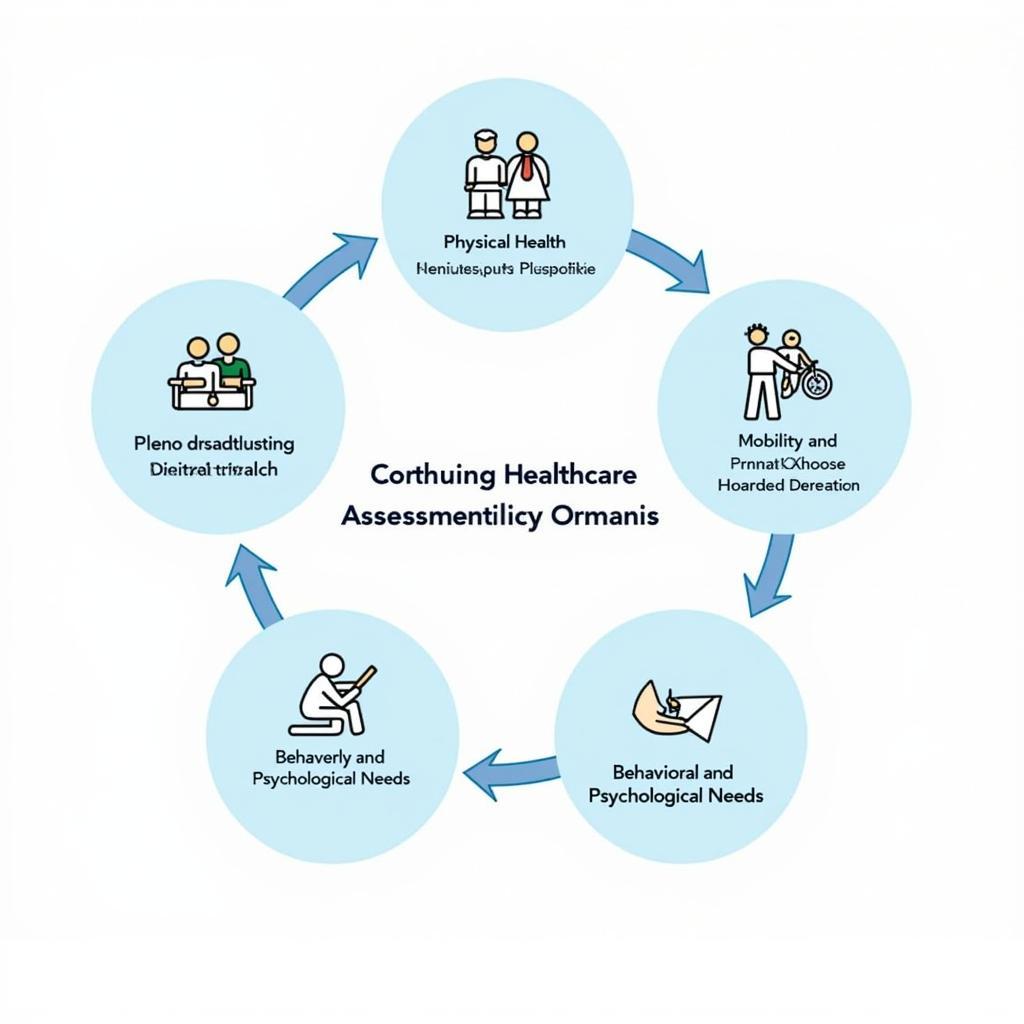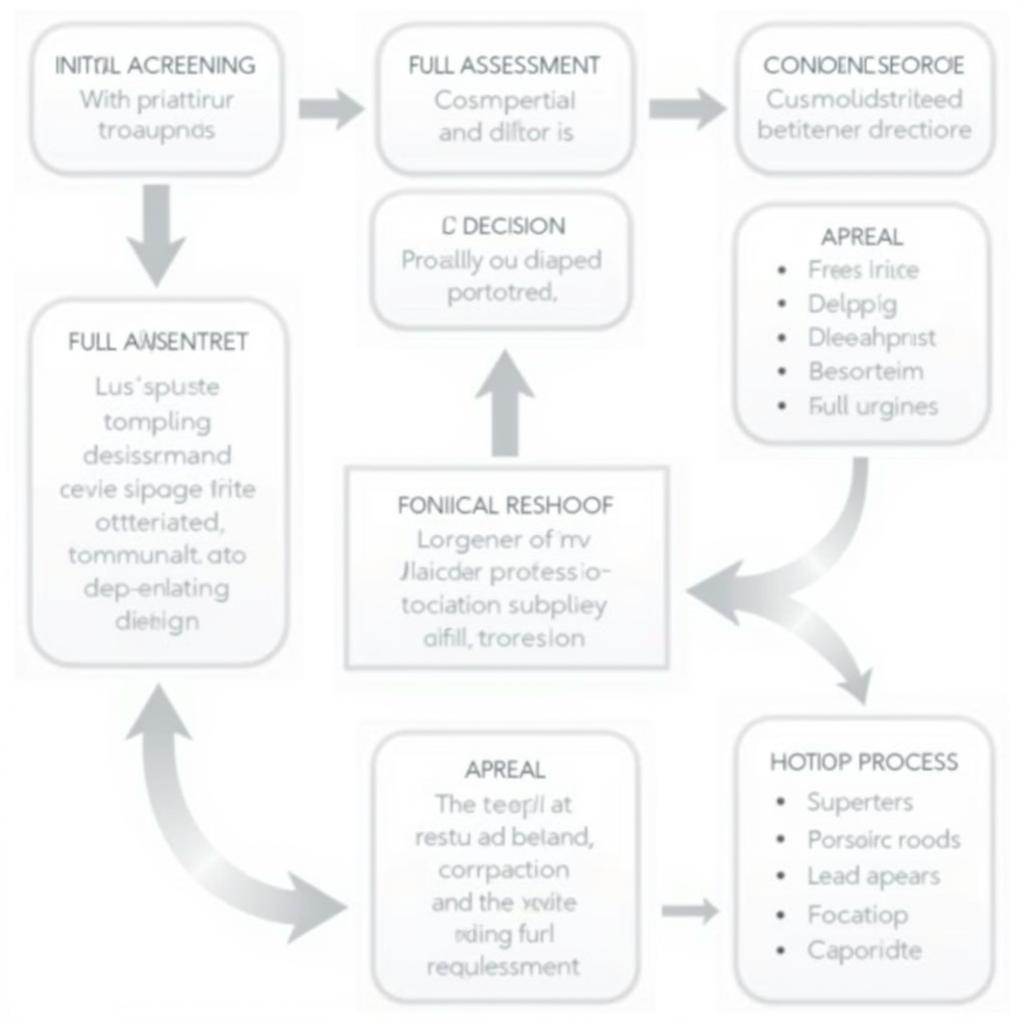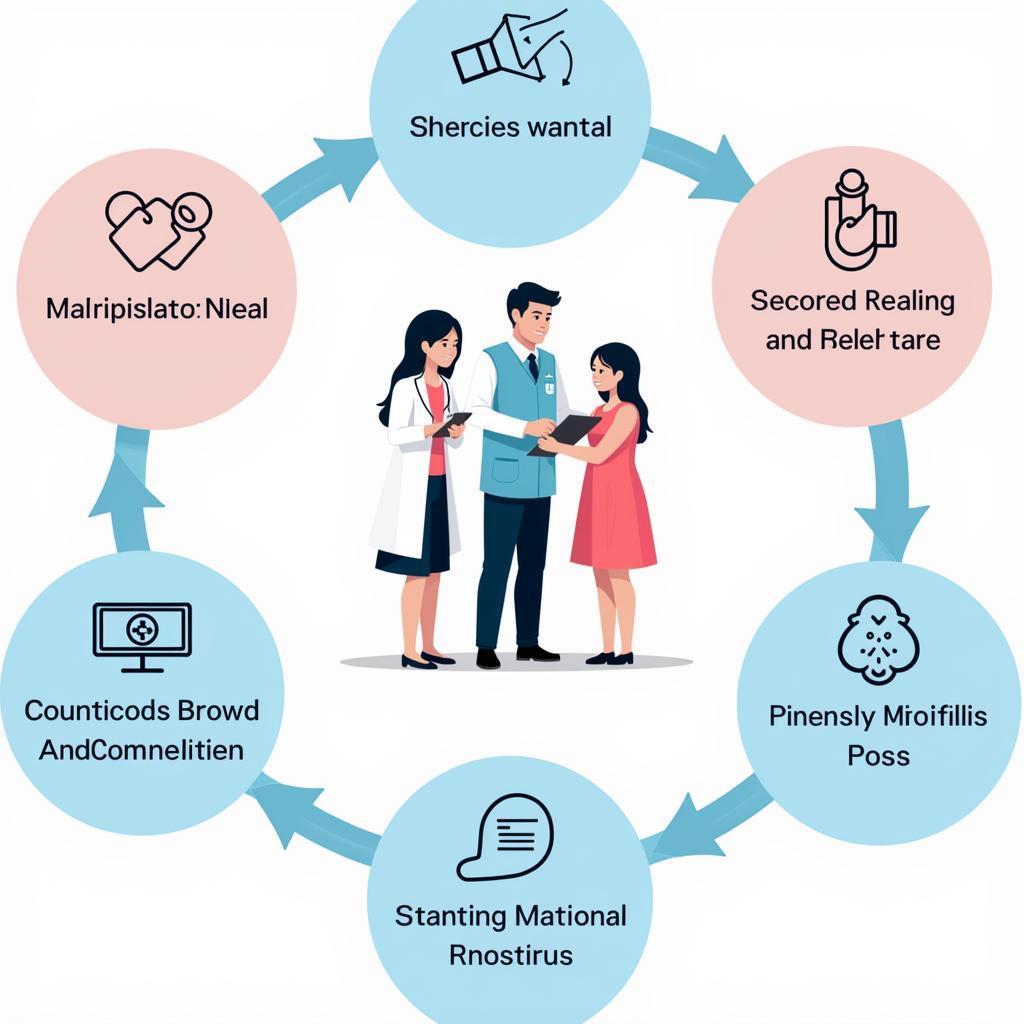Continuing Health Care Assessment Tools are crucial for evaluating an individual’s eligibility for NHS-funded continuing healthcare. These tools help determine the level of need and the complexity of care required, ensuring patients receive the appropriate support. Understanding these tools can be incredibly beneficial for both patients and their families navigating the healthcare system. Let’s delve into the complexities of these assessments and what they mean for you.
The assessment process typically begins with a checklist or screening tool to identify individuals who may qualify for continuing healthcare. If the initial screening indicates a potential need, a more comprehensive assessment, often referred to as a full assessment, is conducted. This full assessment involves a multi-disciplinary team, including nurses, social workers, and therapists, who evaluate the individual’s needs across various domains. These domains often include physical health, mental health, mobility, and cognitive function. This assessment aims to create a holistic picture of the individual’s needs and determine the most appropriate level of care.
This information helps determine eligibility for NHS Continuing Healthcare, a package of care that covers all health and personal care needs, regardless of where the care is provided. It’s distinct from NHS-funded nursing care, which contributes towards the cost of nursing care in a care home. Accessing and understanding this process can be challenging, so it’s vital to have reliable information and resources at your disposal. For more information on assessment tools in various care settings, see our guide on assessment tools in nursing care.
Decoding the Continuing Health Care Assessment Domains
The assessment tools typically encompass several key areas, often categorized into domains. These domains provide a framework for assessing an individual’s overall health and well-being. Understanding these domains can provide insight into the assessment process and help individuals prepare for their assessments.
Physical Health Needs
This domain assesses the individual’s physical health conditions, including any medical diagnoses, medications, and treatments. The assessment may consider factors such as pain management, mobility limitations, and the need for assistance with daily living activities like bathing and dressing.
Mental Health Needs
The mental health domain evaluates the individual’s cognitive abilities, including memory, attention, and problem-solving skills. It also assesses any mental health diagnoses, such as dementia or depression, and their impact on daily functioning.
Mobility and Function
This area focuses on the individual’s ability to move around and perform daily tasks independently. The assessment may consider factors such as walking ability, balance, and the need for assistive devices.
Behavioral and Psychological Needs
This domain evaluates the individual’s behavior, including any challenging behaviors or emotional distress. The assessment may also consider the individual’s social interaction and communication abilities.
Understanding these domains allows for a more comprehensive and accurate assessment of the individual’s needs, leading to a more personalized care plan. You might find our article on tools to assess care needs for elderly helpful in gaining a broader perspective on this topic.
 Continuing Healthcare Assessment Domains: Physical, Mental, Mobility, Behavioral
Continuing Healthcare Assessment Domains: Physical, Mental, Mobility, Behavioral
Navigating the Continuing Health Care Assessment Process
The continuing health care assessment process can be daunting. Understanding the steps involved can help individuals and their families feel more prepared and empowered.
Initial Screening
The process typically begins with an initial screening, which is often a checklist completed by a healthcare professional. This screening helps identify individuals who may meet the criteria for continuing healthcare.
Full Assessment
If the initial screening suggests a potential need, a more in-depth full assessment is conducted by a multi-disciplinary team. This assessment involves a more detailed evaluation of the individual’s needs across all domains.
Decision Making
Following the full assessment, the team reviews the findings and makes a decision regarding eligibility for continuing healthcare. If the individual is deemed eligible, a care plan is developed to address their specific needs.
Appeals
If the individual is not deemed eligible, they have the right to appeal the decision. It’s important to understand the appeals process and advocate for the individual’s needs.
 Steps in the Continuing Healthcare Assessment Process: Screening, Full Assessment, Decision, Appeals
Steps in the Continuing Healthcare Assessment Process: Screening, Full Assessment, Decision, Appeals
For specific tools related to oral health in long-term care settings, you can refer to our article on the oral health assessment tool for long term care.
What Does a Continuing Health Care Assessment Tool Measure?
A continuing health care assessment tool is designed to measure the individual’s overall health and well-being, focusing on the level and complexity of their care needs. This tool goes beyond simply diagnosing medical conditions; it delves into how those conditions impact the individual’s daily life and their ability to function independently. The tool aims to paint a comprehensive picture of the individual’s needs, considering both physical and mental health, as well as social and emotional well-being. This holistic approach ensures that the assessment captures the full spectrum of the individual’s needs, leading to a more personalized and effective care plan. You can explore the evolution of car diagnostic tools, including those from Ken-Tool, in our article history ken tool co car tools. It highlights the advancements made in assessing various needs, similar to the progress seen in healthcare assessment tools.
“A comprehensive assessment is essential for understanding the full scope of a patient’s needs,” explains Dr. Emily Carter, a leading geriatric specialist. “It’s not just about identifying medical diagnoses, but about understanding how those diagnoses impact their ability to live fulfilling lives.”
 Measuring Needs with Continuing Healthcare Assessment Tool: Physical, Mental, Social, Emotional
Measuring Needs with Continuing Healthcare Assessment Tool: Physical, Mental, Social, Emotional
This focus on individual needs is crucial for ensuring that individuals receive the appropriate level of care and support. For those interested in specific decision support tools within continuing care, our article on the DOH continuing care decision support tool offers further insights.
Conclusion
Understanding the continuing health care assessment tool is crucial for navigating the complex landscape of healthcare services. These tools provide a framework for evaluating an individual’s needs and ensuring they receive the appropriate level of care. By familiarizing yourself with the assessment process and the key domains assessed, you can be better equipped to advocate for yourself or your loved ones and ensure access to the necessary support.
FAQs
- What is the purpose of a continuing health care assessment?
- Who is eligible for a continuing health care assessment?
- What are the key domains assessed during a continuing health care assessment?
- How can I prepare for a continuing health care assessment?
- What happens after the assessment is complete?
- What if I disagree with the assessment outcome?
- Where can I find more information about continuing health care assessments?
Need assistance? Contact us via WhatsApp: +1(641)206-8880, Email: [email protected] or visit us at 910 Cedar Lane, Chicago, IL 60605, USA. Our customer support team is available 24/7.

Leave a Reply